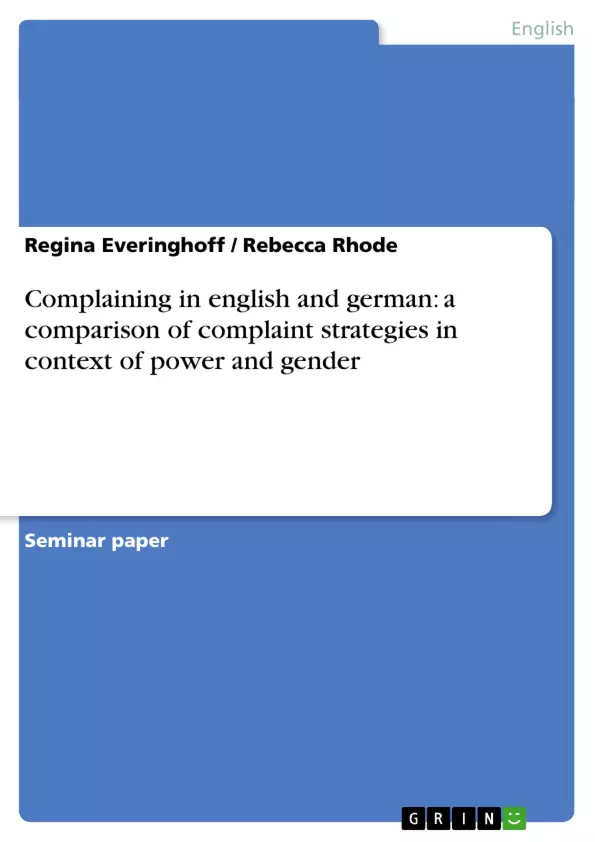This research on speech acts was carried out at the University of Muenster during a linguistic seminar on cross-cultural communication. As already expressed in the title, this paper deals with complaints and furthermore with complaint strategies. A more detailed description of the circumstances and method of the research will be given further below.
In order to find out about different complaint strategies the context in which complaints are uttered will be closer looked at and also the way in which complaints are expressed. It seems therefore necessary, after an outline of what is going to be discussed in this paper, to provide the reader with a short introduction on complaints. Furthermore, an overview of the research field on complaints will be presented in the introduction. The main part of this paper will include the formulation of two hypothesis which form the basis of this project and therefore will be tested throughout this paper. In a next step, the context of this project will be closer looked at and also the method of collecting the data. Furthermore, the different scenarios of the applied “Discourse Completion Test” (DCT)(Appendix 1 and 2) are going to be presented and commented for a better understanding of this project. By then, the reader will have been provided with all necessary background information on this research project and the actual analysis of the collected data can be advanced. With the three formulated hypothesis in mind, our six scenarios will be examined and evaluated according to several categories, such as the level of directness in the headact, the use of downgraders and the number of supportive moves applied in the complaint strategy. The different numbers will be illustrated by help of several tables and figures in order to point out relations and differences between the chosen categories. After this, the results will be discussed on the basis of the earlier formulated hypothesis which will either be confirmed or falsified. Here, we will also try to compare our results to previous findings. Finally, a conclusion will provide a brief summary of what was found out and possibly provide some aspects for further research. If possible, since the project was carried out in the context of teaching English at school, conclusions for the language classroom will be drawn.
Inhaltsverzeichnis (Table of Contents)
- Introduction (R.R.)
- Research Questions (R.R.)
- The study (R.E.)
- Results
- Explicit vs. implicit complaints (R.E.)
- Supportive Moves (R.R.)
- Use of apologizing expressions as downgraders (R.E.)
- Conclusion (R.E.)
Zielsetzung und Themenschwerpunkte (Objectives and Key Themes)
The research paper explores different complaint strategies in cross-cultural communication, focusing on the differences between English and German speakers. The study aims to investigate whether cultural background and gender influence the way complaints are expressed.
- Cultural differences in complaint strategies
- Gender differences in complaint strategies
- Directness and indirectness in complaint language
- Supportive moves and downgraders in complaint strategies
- The role of politeness in complaint expression
Zusammenfassung der Kapitel (Chapter Summaries)
The introduction defines complaints as speech acts and explores their connection to face-threatening acts (FTAs), highlighting the importance of face needs in communication. The chapter delves into the concept of 'face' as described by Goffman and Brown and Levinson, outlining the distinction between positive and negative face.
The 'Research Questions' section outlines the study's aim to investigate the differences in complaint strategies between English and German speakers, as well as between men and women. It introduces the two main hypotheses: 1) English native speakers are more polite and use more supportive moves in complaints than German speakers, and 2) Men are more direct and use more explicit complaints than women.
The 'The study' chapter describes the research methodology employed, which involved a Discourse Completion Test (DCT) consisting of six scenarios designed to elicit complaints from participants. This section explains the practical aspects of the study, highlighting the challenges encountered in collecting and analyzing the data.
Schlüsselwörter (Keywords)
The research paper focuses on complaint strategies, cross-cultural communication, gender differences, face-threatening acts (FTAs), directness, indirectness, supportive moves, downgraders, politeness, discourse completion test (DCT), and cultural differences in language use.
- Quote paper
- Regina Everinghoff (Author), Rebecca Rhode (Author), 2003, Complaining in english and german: a comparison of complaint strategies in context of power and gender, Munich, GRIN Verlag, https://www.hausarbeiten.de/document/21275


